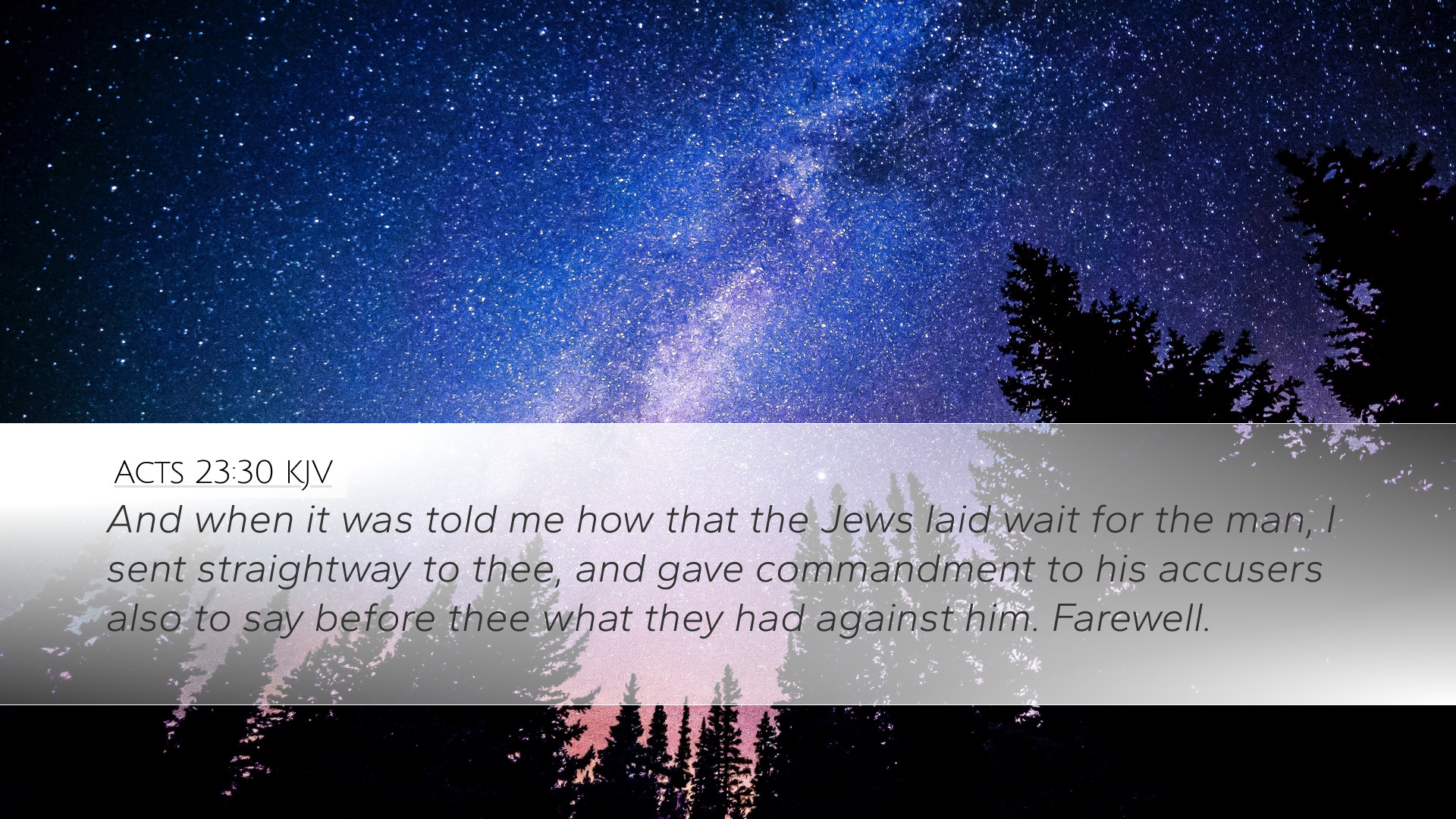Commentary on Acts 23:30
Bible Verse: Acts 23:30 - "And when it was determined that Paul should be brought to the judgment seat, I sent straightway to thee; and I have no certain thing to write unto my lord. Wherefore I have brought him forth before thee, and especially before thee, O king Agrippa, that after examination had, I might have somewhat to write."
Introduction
The passage in Acts 23:30 serves not only as a critical point in the narrative of Paul's trial but also as a transition in the broader context of the early church's struggles. This analysis will draw from the rich insights of esteemed public domain commentators, including Matthew Henry, Albert Barnes, and Adam Clarke, providing a multifaceted view of its theological, historical, and practical implications.
Contextual Analysis
As we approach this verse, it is important to consider the historical and geographical context. Paul, having been seized by the Jews, is now appealing to the Romans for a fair trial. The mention of King Agrippa introduces significant political intrigue and the imperfect justice of the Roman system.
Political Dynamics
Matthew Henry elaborates on the political machinations at play. He notes that the Roman authorities were often influenced by the local factions and cultures. Paul's situation exemplifies how the early Christians were often caught in the web of political maneuvering, which sheds light on the precarious position of believers during this period.
Paul's Defense
Albert Barnes reinforces the idea that Paul's appeal to Agrippa represents a calculated strategy in his defense. He emphasizes that Paul's manner was dignified and respectful, indicating his resolve to maintain a testimony that would endure scrutiny.
Theological Implications
This passage raises several theological points worthy of exploration:
- God's Sovereignty: Adam Clarke points out that despite the apparent chaos, God's providence is at work. Paul's situation, although dire, serves a divine purpose in advancing the gospel.
- Justice and Injustice: The verse reflects on the themes of justice and injustice in human systems. The acknowledgment of uncertainty in writing to the governor emphasizes the inadequacies within the judicial process, mirroring the moral and ethical challenges faced by Christians in the world today.
Historical Reflection
Examining the historical backdrop provides valuable insights into societal structures and the treatment of individuals within the legal system of the Roman Empire. Henry notes that Paul’s status as a Roman citizen afforded him certain rights; his appeal signifies an example of exercising those rights in unwavering faith.
Impact on Early Christianity
The experience of Paul serves as a microcosm of the experiences of early Christians who faced persecution. Barnes comments that the courage exhibited by Paul is a source of inspiration for believers under pressure. This circumstance illustrates the duality of fear and faith, where the act of standing firm becomes a testimony of one's beliefs.
Practical Applications
For today's pastors, students, and theologians, Acts 23:30 offers several practical applications:
- Embrace Challenges: Just as Paul embraced his trial as an opportunity for testimony, believers today are called to view challenges as platforms for the gospel.
- Engage the Culture: Paul’s respectful addressing of authorities reflects the call for Christians to engage constructively with their cultures, seeking to witness to the truth of the gospel effectively.
- Trust in God’s Plan: The overarching theme is the reassurance that God’s providence governs life’s trials, encouraging believers to trust Him even when circumstances appear overwhelming.
Conclusion
Acts 23:30 encapsulates a pivotal moment in the apostolic narrative, rich with themes of justice, faith, and God's providential care. By synthesizing insights from Matthew Henry, Albert Barnes, and Adam Clarke, we gain a holistic understanding of the complexities surrounding Paul’s interactions with the Roman authorities. May this commentary serve as an encouragement to all who seek wisdom from the Scriptures, reminding us of the enduring truth that God’s plans unfold through our life's tumultuous moments.


